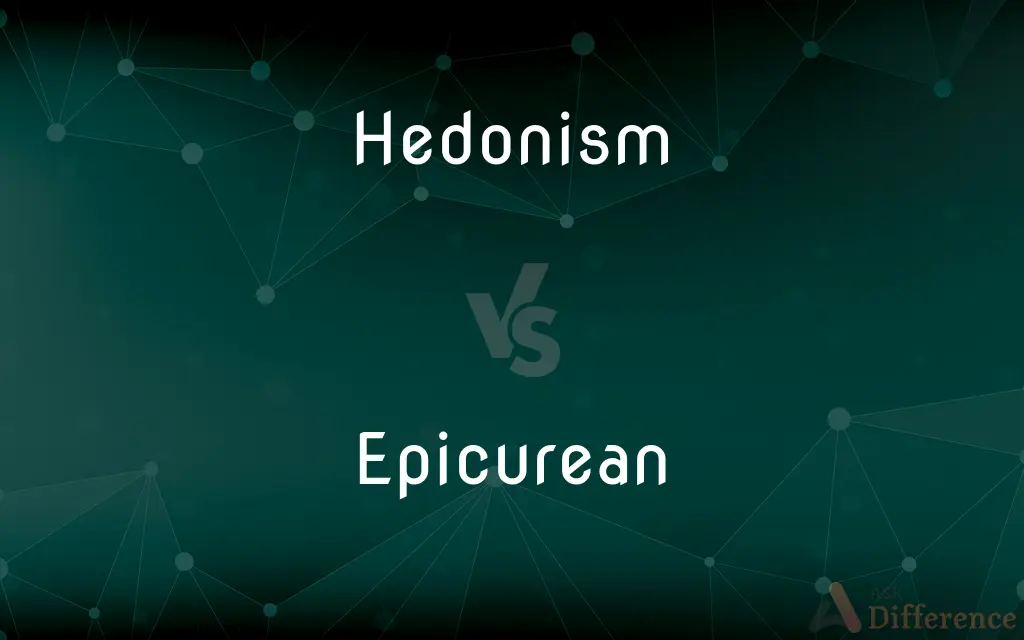Hedonism vs. Epicurean — What's the Difference?
By Fiza Rafique & Urooj Arif — Updated on April 2, 2024
Hedonism is the ethical theory that pleasure is the highest good and aim of human life, while Epicureanism is a philosophy that advocates for modest pleasures, intellectual contemplation, and minimal pain as keys to happiness.

Difference Between Hedonism and Epicurean
Table of Contents
ADVERTISEMENT
Key Differences
Hedonism is an ethical framework suggesting that pleasure and happiness are the primary or most important intrinsic goods and the aim of human life. It emphasizes the pursuit of pleasure as the ultimate goal. On the other hand, Epicureanism, founded by Epicurus, is a more nuanced philosophy that also values pleasure as the highest good but advocates for a life of moderate pleasures, intellectual satisfaction, and the absence of pain (both physical and mental) as the path to happiness.
While hedonism is often interpreted as the pursuit of maximum pleasure without much consideration for the long-term consequences, Epicureanism emphasizes the pursuit of more sustainable, modest pleasures that lead to a state of tranquility (ataraxia) and freedom from fear (aponia) as well as the absence of bodily pain. This distinction underlines a deeper philosophical understanding in Epicureanism about what constitutes true happiness, suggesting that not all pleasures are worth pursuing if they lead to greater pain in the future.
Hedonism encompasses a broader category of ethical theories that can include both the pursuit of physical pleasures and the more refined pleasures of the mind. In contrast, Epicureanism specifically identifies certain types of pleasure as preferable, notably those that satisfy natural and necessary desires, and it places a significant emphasis on the enjoyment of simple pleasures, such as friendship, freedom from fear, and analytical thought, as the foundation of a happy life.
The hedonistic view is often criticized for potentially leading to self-indulgence and the neglect of moral duties or long-term well-being. Epicureanism, however, incorporates a kind of ethical calculus that considers the potential negative consequences of pursuing certain pleasures and advises against engaging in activities that could lead to harm or disturbance of one's peace of mind.
In practice, a purely hedonistic lifestyle might involve indulging in sensual pleasures without much concern for their eventual impact on one's health or societal responsibilities. Epicureanism, conversely, advocates for a balanced life where pleasure is sought in harmony with ethical considerations and the avoidance of pain, leading to a more sustainable and considered approach to happiness.
ADVERTISEMENT
Comparison Chart
Definition
Pursuit of pleasure as the highest good
Pursuit of moderate pleasures for happiness
Key Focus
Pleasure and happiness
Pleasure, intellectual contemplation, minimal pain
Approach to Pleasure
Maximizing pleasure regardless of type
Preferring sustainable, intellectual pleasures
Long-term Considerations
Often overlooked
Central to philosophy
Role of Pain
To be avoided but not deeply analyzed
Analyzed and avoided through moderate living
Ethical Considerations
Secondary to the pursuit of pleasure
Integral, with a focus on avoiding harm
Ideal Outcome
Maximum pleasure
Tranquility, freedom from fear, absence of pain
Compare with Definitions
Hedonism
Ethical hedonism argues for pleasure as the basis for moral decisions.
A hedonist may volunteer, finding joy in helping others.
Epicurean
A philosophy advocating for simple pleasures, knowledge, and moderation.
An Epicurean might find joy in a quiet evening with friends.
Hedonism
A philosophy that identifies pleasure as the highest good.
Hedonism can justify a lavish lifestyle if it maximizes happiness.
Epicurean
Emphasizes the enjoyment of life's simple pleasures.
Gardening or reading, for an Epicurean, are ideal leisurely pursuits.
Hedonism
The pursuit of pleasure as the primary goal of life.
In hedonism, attending a grand feast is celebrated for its immediate joy.
Epicurean
Advocates for a life of modest pleasures and intellectual growth.
An Epicurean lifestyle includes meaningful conversations over luxurious banquets.
Hedonism
A principle where pleasure outweighs other considerations.
A hedonist might prioritize a career that offers more leisure time.
Epicurean
Teaches that true happiness comes from avoiding pain and fear.
Epicureanism values serene activities that foster peace of mind.
Hedonism
Focuses on personal happiness and pleasure.
Hedonism supports indulging in one’s favorite activities frequently.
Epicurean
Considers the absence of pain as a form of pleasure.
For Epicureans, good health is a state of pleasure because it is the absence of pain.
Hedonism
Hedonism refers to a family of theories, all of which have in common that pleasure plays a central role in them. Psychological or motivational hedonism claims that our behavior is determined by desires to increase pleasure and to decrease pain.
Epicurean
Devoted to the pursuit of sensual pleasure, especially to the enjoyment of good food and comfort.
Hedonism
The pursuit of pleasure; sensual self-indulgence.
Epicurean
Suited to the tastes of an epicure
An epicurean feast.
Hedonism
Pursuit of or devotion to pleasure, especially to the pleasures of the senses.
Epicurean
Epicurean Of or relating to Epicurus or Epicureanism.
Hedonism
(Philosophy) The ethical doctrine holding that only what is pleasant or has pleasant consequences is intrinsically good.
Epicurean
A devotee to sensuous and luxurious living; an epicure.
Hedonism
(Psychology) The doctrine holding that behavior is motivated by the desire for pleasure and the avoidance of pain.
Epicurean
Epicurean A follower of Epicurus.
Hedonism
The belief that pleasure or happiness is the highest good in life. Some hedonists, such as the Epicureans, have insisted that pleasure of the entire mind, not just pleasure of the senses, is the highest good.
Epicurean
Pursuing pleasure, especially in reference to food or comfort.
Hedonism
(countable) A general devotion to the pursuit of pleasure.
Epicurean
Devoted to luxurious living.
Hedonism
The doctrine of the Hedonic sect; the pursuit of pleasure as a matter of ethical principle.
Epicurean
One who is devoted to pleasure.
Hedonism
The ethical theory which finds the explanation and authority of duty in its tendency to give pleasure.
Epicurean
Pertaining to Epicurus, or following his philosophy.
Hedonism
The pursuit of pleasure as a matter of ethical principle
Epicurean
Given to luxury; adapted to luxurious tastes; luxurious; pertaining to good eating.
Courses of the most refined and epicurean dishes.
Hedonism
An ethical system that evaluates the pursuit of pleasure as the highest good
Epicurean
A follower or Epicurus.
Epicurean
One given to epicurean indulgence.
Epicurean
A person devoted to refined sensuous enjoyment (especially good food and drink)
Epicurean
Of Epicurus or epicureanism;
Epicurean philosophy
Epicurean
Devoted to pleasure;
A hedonic thrill
Lives of unending hedonistic delight
Epicurean pleasures
Epicurean
Furnishing gratification of the senses;
An epicurean banquet
Enjoyed a luxurious suite with a crystal chandelier and thick oriental rugs
Lucullus spent the remainder of his days in voluptuous magnificence
A chinchilla robe of sybaritic lavishness
Common Curiosities
Can a hedonist also be an Epicurean?
Yes, a hedonist can adopt Epicurean principles if they value moderate pleasures and the intellectual aspects of happiness.
What is the main difference between hedonism and Epicureanism?
The main difference is in their approach to pleasure; hedonism often seeks maximum pleasure, while Epicureanism advocates for modest, sustainable pleasures that lead to tranquility and the absence of pain.
Why does Epicureanism emphasize moderation?
Epicureanism emphasizes moderation because it leads to a balanced life, avoiding the negative consequences that excessive pleasures can bring.
Is Epicureanism a form of hedonism?
Yes, Epicureanism is a form of hedonism that focuses on the pursuit of moderate, sustainable pleasures and intellectual growth for happiness.
Does hedonism ignore ethical considerations?
Not necessarily. While some forms of hedonism might prioritize pleasure over ethics, others, like ethical hedonism, consider the pursuit of pleasure to be aligned with ethical living.
Is Epicureanism practical in modern times?
Yes, many find Epicureanism's focus on simple pleasures, intellectual development, and community very relevant and practical for achieving happiness in modern times.
Are all pleasures equally valued in hedonism?
In broad hedonism, yes, all pleasures can be pursued, but some hedonists may prioritize intellectual or emotional pleasures over physical ones for their lasting satisfaction.
Can pursuing pleasure lead ta happiness according to both philosophies?
Yes, both philosophies agree that pursuing pleasure can lead to happiness, but they differ in their views on what kinds of pleasure and how they should be pursued.
Can one find happiness without pleasure according to Epicureanism?
For Epicureans, happiness is intricately linked to pleasure, specifically the pleasures of a tranquil and pain-free life, so happiness without some form of pleasure is unlikely.
How does Epicureanism view material wealth?
Epicureanism does not see material wealth as an end in itself but values it only insofar as it contributes to a life of modest pleasure and the absence of pain.
Do Epicureans reject all forms of luxury?
Epicureans don't necessarily reject luxury, but they do scrutinize it to ensure it doesn't lead to greater pain or disturb one's peace of mind.
Share Your Discovery

Previous Comparison
Abode vs. Home
Next Comparison
Cane vs. SwishAuthor Spotlight
Written by
Fiza RafiqueFiza Rafique is a skilled content writer at AskDifference.com, where she meticulously refines and enhances written pieces. Drawing from her vast editorial expertise, Fiza ensures clarity, accuracy, and precision in every article. Passionate about language, she continually seeks to elevate the quality of content for readers worldwide.
Co-written by
Urooj ArifUrooj is a skilled content writer at Ask Difference, known for her exceptional ability to simplify complex topics into engaging and informative content. With a passion for research and a flair for clear, concise writing, she consistently delivers articles that resonate with our diverse audience.














































